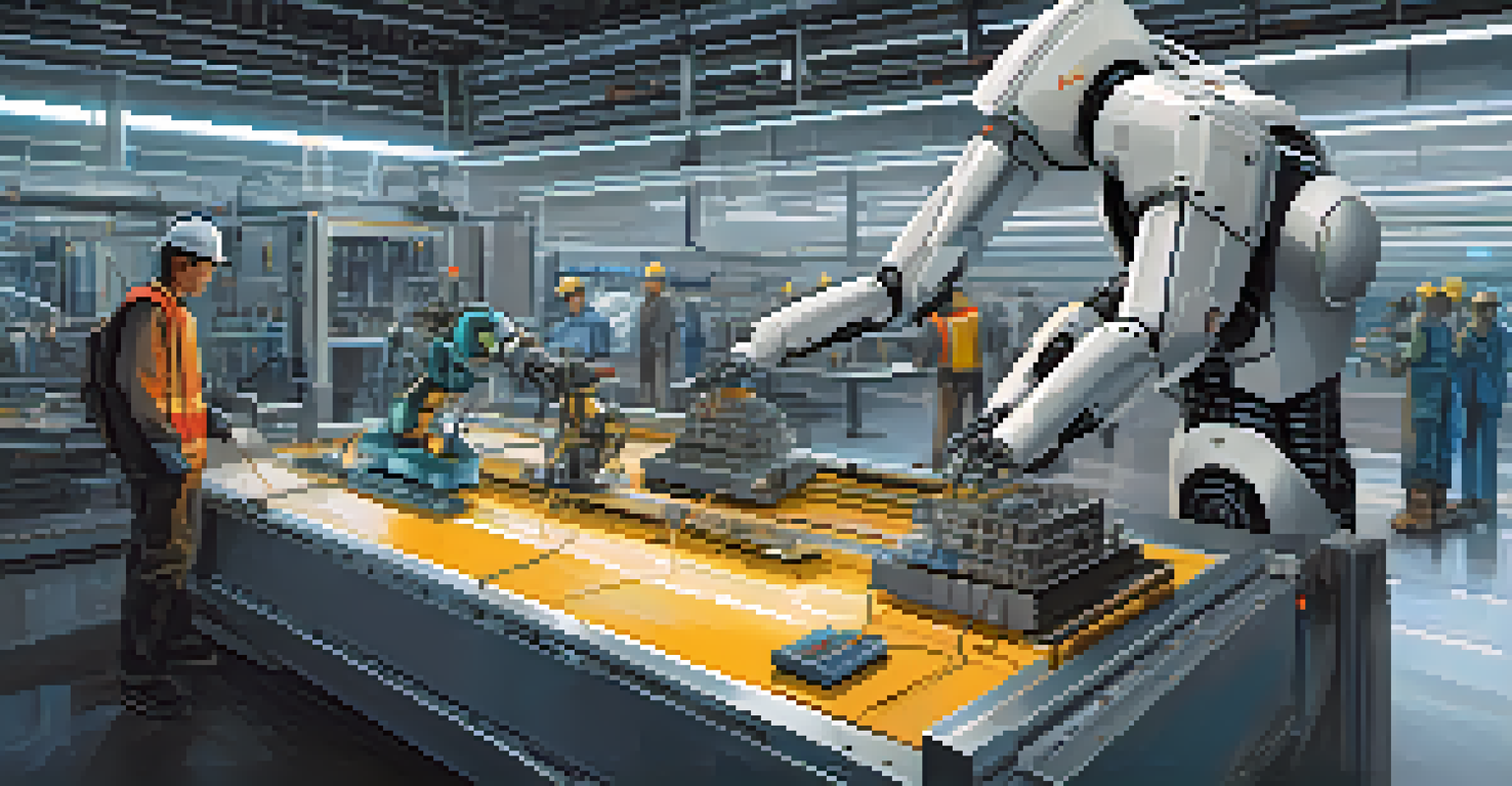AI and the Future of Work: Ethical Challenges Ahead

Understanding AI's Role in the Future Workplace
Artificial Intelligence (AI) is rapidly reshaping the workplace, automating tasks that were once the domain of humans. From chatbots handling customer service inquiries to algorithms analyzing vast data sets, AI is becoming an integral part of many industries. This shift not only enhances efficiency but also raises important questions about the human workforce's role and the skills needed in the future. As we embrace these technologies, understanding their impact on our jobs is crucial.
Artificial intelligence is the new electricity.
For instance, a factory worker might find themselves working alongside robots, which can perform repetitive tasks faster and with greater precision. This transition can lead to increased productivity, but it also necessitates a shift in the worker's skill set. Workers may need to learn how to manage and maintain these AI systems rather than perform the tasks they once did. The challenge lies in preparing the workforce for this new environment, ensuring no one is left behind.
Moreover, as AI continues to evolve, its potential to take over more complex tasks raises concerns about job displacement. While some roles may vanish, new opportunities will emerge that require a blend of technical and human skills. By understanding AI's role, we can better prepare ourselves for the future, focusing on education and training that aligns with this technological transformation.
Ethical Dilemmas: Bias in AI Systems
One of the most pressing ethical challenges in AI is the potential for bias in decision-making processes. AI systems learn from existing data, and if that data contains biases, the AI will perpetuate them. For instance, hiring algorithms trained on biased historical data might favor certain demographics over others, leading to unfair hiring practices. This raises significant ethical concerns about equality and fairness in the workplace.

Consider a company that uses AI to screen job applications. If the AI is biased towards candidates from certain backgrounds, it could overlook talented individuals who don’t fit that mold. This not only harms the candidates but also limits the company’s potential for diversity and innovation. Addressing these biases is crucial to ensure that AI serves as a tool for inclusion rather than exclusion.
AI Enhances Workplace Efficiency
Artificial Intelligence is transforming workplaces by automating tasks and requiring workers to adapt their skill sets.
To combat this issue, organizations must implement rigorous testing and auditing of their AI systems. Transparency in AI decision-making processes can help identify biases and rectify them before they affect hiring or promotions. By fostering a culture of accountability, companies can leverage AI responsibly while promoting fairness and equality in their workplaces.
Data Privacy Concerns in AI Adoption
As AI systems collect and analyze vast amounts of data, concerns about data privacy have come to the forefront. Employees often worry about how their personal information is being used and whether it is secure from breaches. For example, AI tools that monitor employee performance can unintentionally invade privacy, leading to discomfort and distrust in the workplace.
The future is already here — it's just not very evenly distributed.
Imagine a scenario where a company uses AI to track employee productivity through various metrics. While the intention might be to optimize performance, employees may feel like they're under constant surveillance, which can create a toxic work environment. Striking a balance between leveraging data for improvement and maintaining employee privacy is a crucial ethical consideration.
To address these concerns, organizations should prioritize transparency about data collection and usage. Establishing clear policies that protect employee data and foster trust can contribute to a more positive workplace atmosphere. Moreover, engaging employees in discussions about their data rights and privacy can empower them and alleviate concerns regarding AI implementation.
Job Displacement: Preparing for Change
As AI continues to advance, the fear of job displacement is a significant concern for many workers. While technology has always created and destroyed jobs, the speed at which AI is evolving presents unique challenges. Industries such as manufacturing and retail may see significant shifts in employment dynamics, prompting a need for proactive measures to support displaced workers.
For instance, a cashier may find their role replaced by an automated checkout system. This change can be distressing, not just for the individual but for entire communities dependent on those jobs. However, with strategic planning and investment in retraining programs, workers can acquire new skills that align with emerging job markets.
Bias and Ethics in AI Systems
Addressing bias in AI is crucial to ensure fair hiring practices and promote diversity in the workplace.
Governments and businesses play a crucial role in facilitating this transition. By collaborating to create retraining programs and support systems, they can help workers adapt to the evolving job landscape. Emphasizing continuous learning and adaptability will empower individuals to navigate the future of work confidently.
The Importance of Human Skills in an AI World
As AI takes over more technical tasks, the importance of human skills becomes increasingly apparent. Skills such as emotional intelligence, creativity, and critical thinking are irreplaceable by machines and will be highly valued in the workforce of the future. For employers, this means recognizing and fostering these human-centric skills within their teams.
Consider a marketing team that utilizes AI to analyze consumer data. While AI can provide insights, it’s the team’s creativity that will develop campaigns that resonate with people. As the landscape changes, companies will need to prioritize hiring individuals who excel in interpersonal skills and innovative thinking, complementing AI’s capabilities.
Training programs that emphasize these human skills will be essential for both personal and organizational growth. By creating a culture that values collaboration and empathy alongside technology, businesses can thrive in a future where AI and humans work hand-in-hand.
Regulatory Frameworks for Ethical AI
To ensure the ethical application of AI in the workplace, robust regulatory frameworks are essential. Governments and organizations must establish guidelines that govern AI development and implementation, focusing on accountability, transparency, and fairness. By doing so, they can mitigate risks associated with AI and foster trust within the workforce.
For example, regulations could mandate that companies regularly audit their AI systems for bias and effectiveness. This proactive approach allows organizations to identify and address potential ethical issues before they escalate. Moreover, involving diverse stakeholders in the regulatory process can help create comprehensive frameworks that consider various perspectives and needs.
Collaboration: Humans and AI
The future of work will focus on collaboration between humans and AI, enhancing productivity and fostering innovation.
Ultimately, a collaborative effort between policymakers, businesses, and technology developers will be crucial in shaping a responsible AI landscape. By prioritizing ethical considerations in AI deployment, we can create a future of work that is equitable and sustainable for everyone.
Embracing a Collaborative Future with AI
The future of work will not be about humans versus machines; rather, it will be about collaboration. Embracing AI as a partner can lead to enhanced productivity and innovation. By integrating AI into daily operations, organizations can free up human employees to focus on more strategic and creative tasks, ultimately leading to a more fulfilling work experience.
Consider a scenario where AI handles data analysis, allowing human workers to dedicate their time to brainstorming and developing new ideas. This collaborative approach can lead to breakthroughs that neither humans nor machines could achieve alone. The key is to view AI as a tool that complements human capabilities rather than a replacement.

As businesses move forward, fostering a culture of collaboration between AI and human workers will be essential. Encouraging open dialogue about the benefits and challenges of AI can help create an environment where employees feel empowered to embrace technology as a valuable ally in their work.